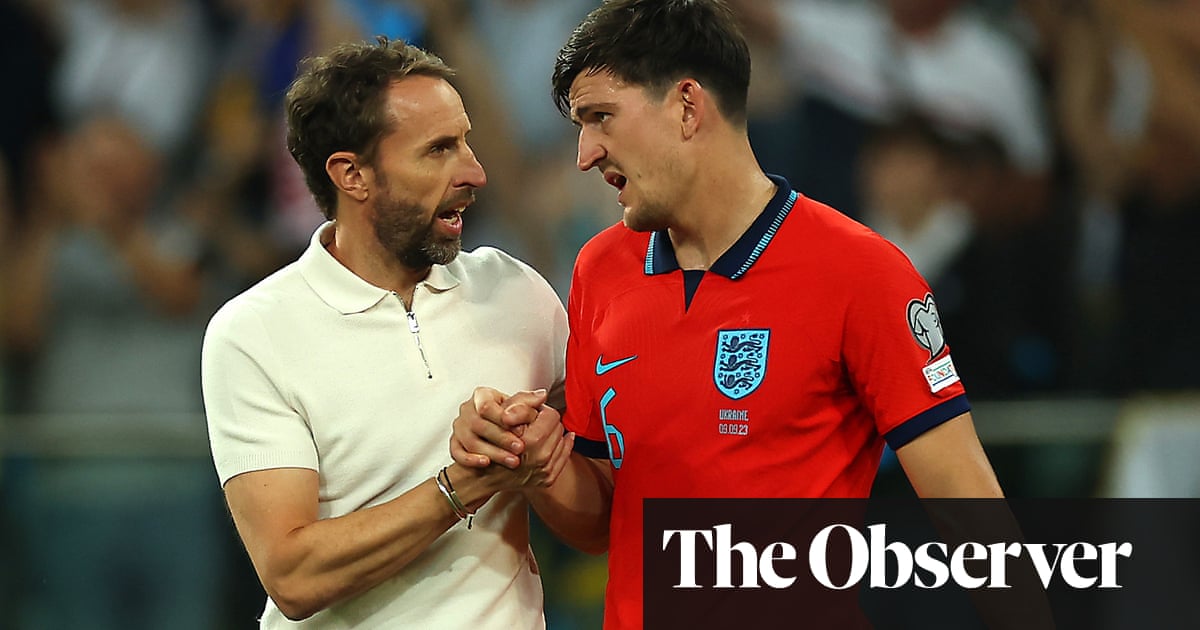
Gareth Southgate had waited almost 10 months to perform the most basic duty of his job as the England manager – to draw up a list of the best players at his disposal and get them together.
He admits it has been a frustrating time, made harder by the restart of club football and having to watch so many of his colleagues do their work while he could not do his. The inactivity has fuelled his hunger. More than ever, he says he wants to take England to the top of the world rankings.
And yet when the moment came on Tuesday to name his squad for the Nations League matches against Iceland and Denmark, Southgate must have felt as if caught between the devil and the deep blue sea.
The Harry Maguire scandal saw to that.
The last time that Southgate had his players with him was last November for the European Championship qualifiers against Montenegro and Kosovo and it was a camp marked by the bust-up between Raheem Sterling and Joe Gomez. Sterling was the aggressor and Southgate felt he had to take firm action. He imposed a one-game internal suspension on the Manchester City winger.
Maguire has been found guilty of rather more and by a much higher authority and when the news came through from the court on the Greek island of Syros that he had been convicted of aggravated assault, resisting arrest and attempted bribery following a violent altercation outside a Mykonos bar on Thursday night, landing him a 21-month suspended prison sentence, it rocked Southgate to the core. And opened him up to criticism.
Southgate had been tied to naming his squad at 2pm and, with the uncertainty over when Maguire’s trial would finish, he was never going to move the timing of the announcement. It was impractical and how would it have looked?
And so Southgate felt he had to decide. To select Maguire or not? To have excluded him might have risked pre-supposing he was guilty. To pick him could have felt inconsistent given his stance against previous player indiscretions.
Southgate went for the latter option, having placed his faith in what Maguire told him had happened outside the bar. Plainly, Maguire had suggested it was not enough to see him convicted and Southgate believed him. He sounded optimistic about how the perception would change once the player’s story came out. It was nevertheless a strategy with high levels of risk involved. Could Southgate have given himself more wriggle room?
At around 3.30pm, Southgate found himself deep into an explanation of his thought processes as Maguire’s trial in front of a three‑person panel was continuing. In terms of awkwardness, it took some beating.
Southgate was asked whether he was in an impossible situation, one in which he would be damned if he did and damned if he did not. And was this not the life of an England manager? Welcome back to work, by the way.
“In a word – yes … to all of that,” Southgate replied. “The profile of this job is different. The expectations are different and the analysis of the decisions is different. I have to live with that and the consequences of that.”
Would Southgate make the same decision again? In all likelihood, yes.
“I think it is fair to say that I am putting a lot of faith in Harry but I think it is fair to do that both in terms of my relationship with him and what he has given to the team,” Southgate had said before the verdict. The notion of innocent until proven guilty, with a little room for manoeuvre after the fact which Southgate did mention, seemed to him to be the right call – or, more specifically, the least bad one.
Does it now look like he made the wrong decision? Also, yes because as Maguire faces up to the consequences of his actions, his punishment has started to go beyond that meted out by the Greek legal system. Southgate’s U-turn over his selection was announced just before 8pm.
Southgate had spoken of Maguire in glowing terms as man and most people would acknowledge that until Thursday night, his reputation as a professional was excellent.
“In terms of character of person, he’s been absolutely outstanding for us and I think the fact Manchester United have made him their captain would highlight that from their point of view as well,” Southgate said. “I’m sure if you speak with any of the many managers and coaches that have worked with him, he’s been a delight to work with.”
Maguire continues to protest his innocence and he will appeal against the verdict but, right now, his image has been badly damaged. The details that the prosecution pressed in court painted a picture of somebody who thought he was above the law and Maguire may forever ask himself why he put himself in the situation in the first place. Footballers have to make sacrifices, as Maguire knows only too well. Avoiding boozy nights with the potential for conflict is surely one of them.
It was interesting to hear Southgate say that he could not “just pick a team to win based on the best behaved XI”. He continued: “It’s just not realistic. If you look at some of the greatest competitors in the world and winners in every sport, they are not always easy to manage and they are not perfect.”
Southgate was answering a question about his recall of Kyle Walker, a player that made high-profile errors during lockdown, but it could apply equally now to Maguire – for whom life has changed seismically over the past few days.












